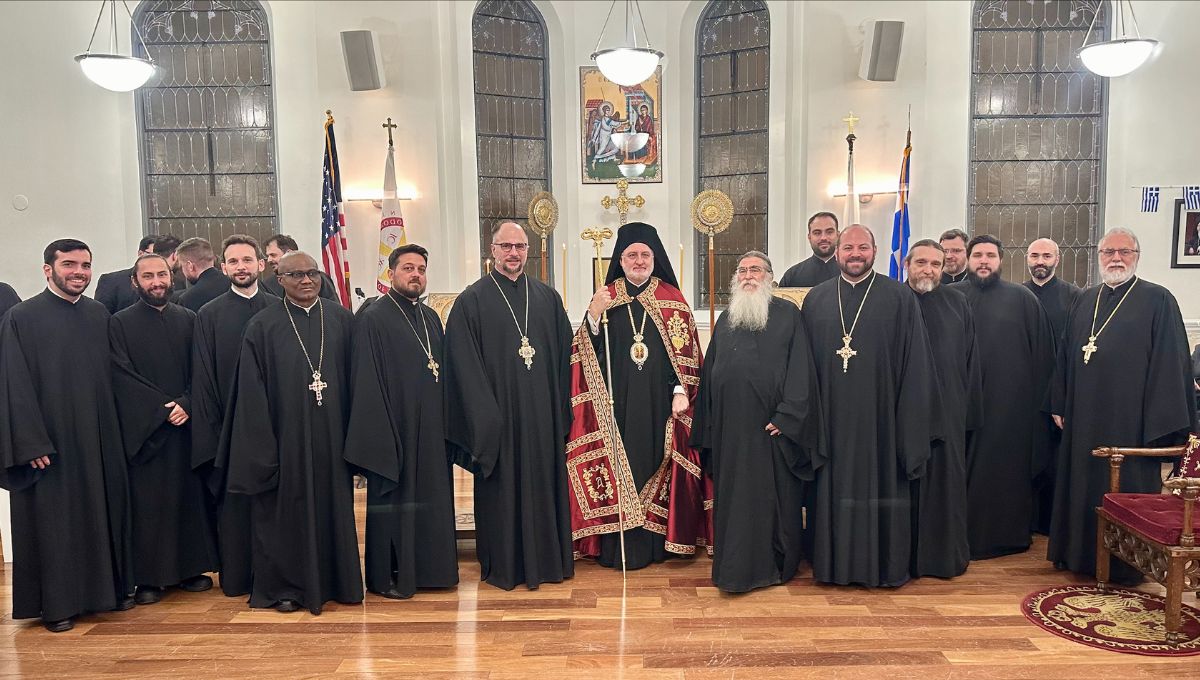His Eminence Archbishop Elpidophoros
Homily at the Great Vespers of the Annunciation
March 24, 2024
Annunciation Greek Orthodox Church
New York, New York
Beloved Sisters and Brothers in Christ:
Tonight we sang:
Ἀπεστάλη ἐξ οὐρανοῦ Γαβριὴλ ὁ Ἀρχάγγελος…
From Heaven the Archangel Gabriel was sent forth…[1]
We know the story, which informs every aspect of our Feast. And we know the words that this Mighty Commander of the Heavenly Host spoke to the Virgin:
Χαῖρε, κεχαριτωμένη· ὁ Κύριος μετὰ σοῦ· εὐλογημένη σὺ ἐν γυναιξίν.
Hail, you who are full of grace. The Lord is with you! Blessed are you among women. [2]
But for a moment, I want you to imagine with me what must have been going through the Archangel’s mind, as he was crossing from the celestial realm to this earth of ours. He traveled from the Throne of the Most High God in Heaven itself, to the little town of Nazareth in Galilee. He knew his message. And he had the power to deliver it, for Gabriel means, “God is my strength.”
But how could this Angel comprehend what was going to take place?
How could he understand that the Throne of God in Heaven was to be within the Womb-Palace of the Holy Virgin?
The Holy Archangel has already visited this region of the earth. Six months before, he had appeared to Zacharias in the Temple, the father of John the Baptist. He gave to this earthly father the good news of the Baptist’s conception by his wife, Elizabeth. In fact, the Divine Messenger delivered that message with such a punch, that when Zacharias doubted his word, claiming that his wife and he were too old to have children, the Angel declared to him:
I am Gabriel, and I stand in the presence of God. I am sent to speak to you, and to show you these glad tidings.
Behold, you shall be mute, and unable to speak, until the day that these things shall be performed, because you did not believe my words, which shall be fulfilled in their season. [3]
But coming to announce the Birth of God in the flesh by a young maiden was a completely different order. The Akathist Hymn reflects this, when it puts into the mouth of Gabriel:
Χαῖρε, βάθος δυσθεώρητον καὶ ἀγγέλων ὀφθαλμοῖς.
Hail, Depth hard to explore, even for the eyes of the Angels. [4]
How could the Archangel understand that the very Creator of the seen and unseen worlds, would choose to dwell in the Virgin and become human?
This mystery was kept even from the Angels, as the hymn says:
Τὸ ἀπ' αἰῶνος ἀπόκρυφον, καὶ ἀγγέλοις ἄγνωστον Μυστύριον· διὰ σοῦ Θεοτόκε τοῖς ἐπὶ γῆς πεφανέρωται…
The Mystery hidden from eternity, was even unknown to the Angels; but through you, O Theotokos, it was made known on earth…[5]
Even a high and mighty Archangel like Gabriel himself, could not comprehend the meaning of the message he was to convey. Yet, convey it, he did. As again the Akathist Hymn triumphantly states:
σωματούμενόν σε θεωρῶν, Κύριε, ἐξίστατο καὶ ἵστατο,
beholding You, O Lord, taking bodily form, he stood in amazement.[6]
Can you imagine? He actually saw the conception of God Himself in the womb of the Virgin, and he was awestruck in holy bewilderment. The humility, the condescension, the love and compassion were vastly beyond an Angel’s comprehension.
Such was the love of God for us. Such was the journey that God would make, crossing over the bridge He created within the womb of his Holy Mother, a bridge as pure as diamond, in order to reach every human being and all creation. In the words of a saintly Hierarch:
All creatures are balanced upon the creative word of God, as if upon a bridge of diamond. Above them is the abyss of divine infinitude, while below them that of their own nothingness. [7]
Therefore, my friends:
[1] Θεοτοκίον, Ἦχος πλ. β', Ἰωάννου Μοναχοῦ.
[2] Luke 1:28.
[3] Luke 1:19-20.
[4] Akathist Hymn, Alpha.
[5] Ἦχος δ' Θεοτοκίον.
[6] Akathist Hymn, Alpha.
[7] Metropolitan Philaret of Moscow (1782 – 1867), quoted in The Mystical theology of the Eastern Church, Vladimir Lossky. New York: St. Vladimir’s Seminary Press, 1976, p. 92.
Photo: GOARCH

